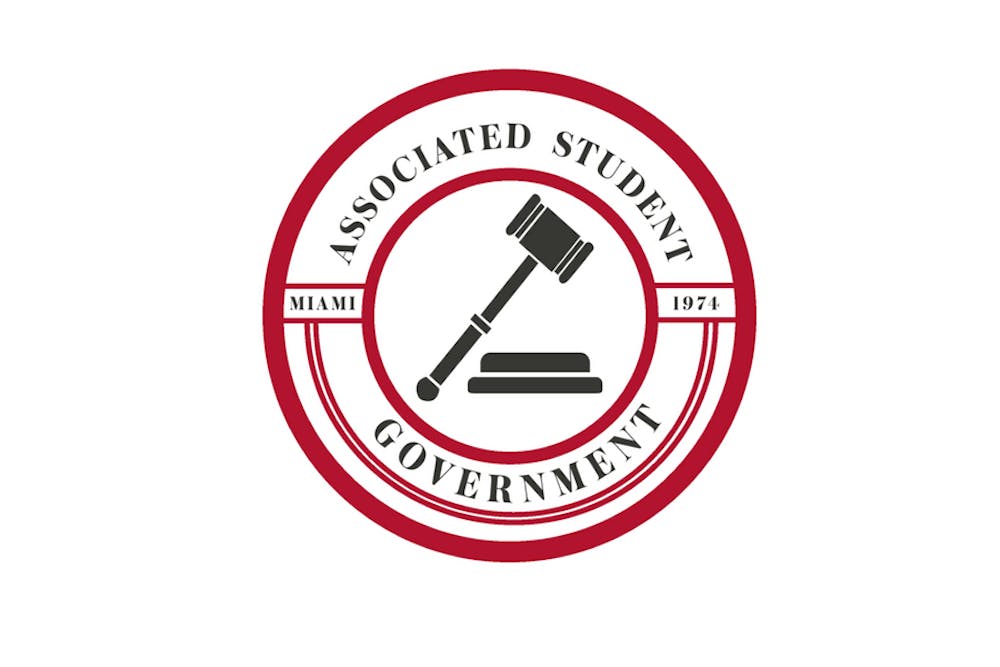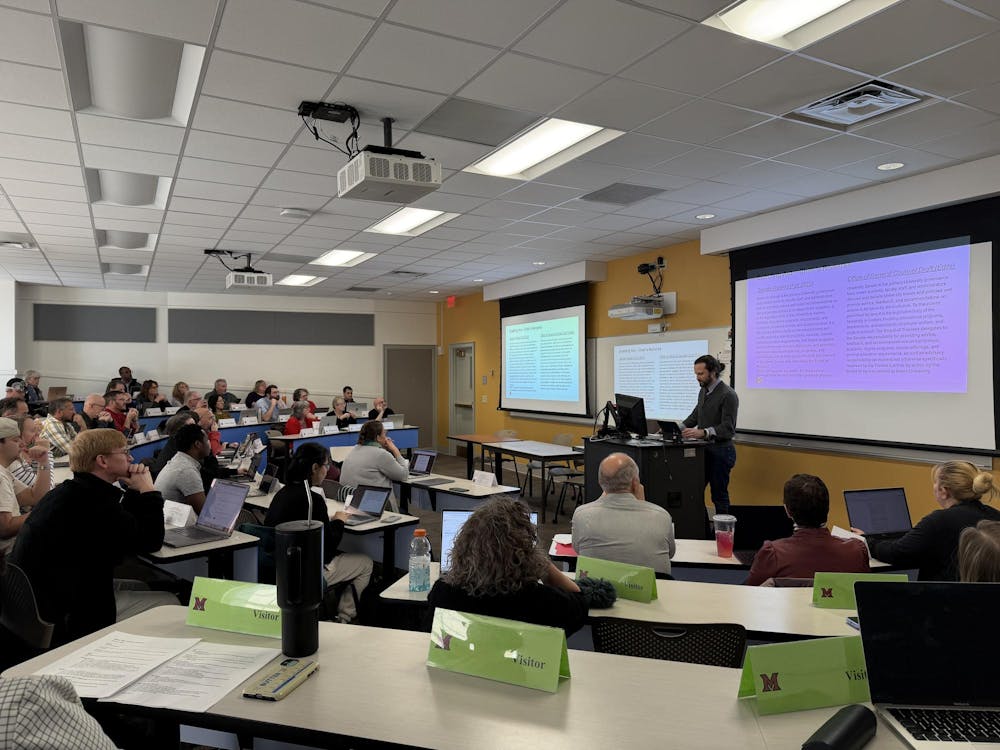At its last meeting of the semester, Miami University’s Associated Student Government (ASG) elected its final cabinet position, approved its new internal operating budget (IOB) and passed six pieces of legislation.
Because ASG voted no confidence for secretary of the treasury at its April 13 meeting, a second election for the position was held on April 27.
Four candidates ran for the position: junior finance and entrepreneurship major Cortlin Morris, junior finance major Harrison Jensen, junior accountancy major Vathsa Yarramsetty and Off-Campus Senator Katie Skelly.
Morris is a member of ASG’s funding & audit (F&A) committee and the current treasurer of Sexual Assault Survivor Support (SASS). She said she would work to increase diversity on the F&A committee if elected.
Jensen has also been on the F&A committee for three years. If elected, he said he would improve communication between the committee and student organizations who are requesting funding.
Yarramsetty said the fact he wasn’t on F&A would give him a more objective perspective on the funding process. He said he would work on increasing transparency for the committee’s work and treat student organizations with empathy.
Skelly also previously served on the F&A committee. She said she would make the committee’s documents more accessible if elected and increase funding to diversity and inclusion-related initiatives.
ASG elected Morris to the position.
ASG also heard a presentation by incoming Student Body President Madelyn Jett’s nomination for chief of staff, Jakin Wu.
Wu said, as chief of staff, he will encourage collaboration between cabinet members and require them to incorporate diversity, equity and inclusion into their work. ASG approved him for the position.
Later in the meeting, ASG heard seven pieces of legislation – four were new business items included on the agenda, one was tabled from a previous meeting and two were not included on the agenda.
The first, authored by Academic Senator Cameron Tiefenthaler, was a sense of senate resolution affirming ASG’s support for composting on campus. It passed unanimously.
Enjoy what you're reading?
Signup for our newsletter
The second was a resolution to allow organizations to request emergency funding hearings. It was authored by Academic Senators Nikhil Patel and Megan Sparks in response to concerns over the lack of funding allocated at the April 20 meeting.
The resolution, which passed unanimously, will allow organizations to request funding of up to $200 during the first 50 days of the fall semester for events such as Mega Fair.
The third resolution, authored by Off-Campus Senator Nhu-Y Tran, encourages Miami to hire Deaf professors to teach its American Sign Language (ASL) and Deaf culture courses.
According to the text of the resolution, nearly all other Ohio universities with ASL programs employ Deaf professors to teach those classes, but Miami does not.
On-Campus Senator Sidra Capriolo expressed support for the resolution.
“I am a Spanish major myself, and I don't think I've taken a single class with a professor who wasn't Spanish first language,” Capriolo said. “When I found out that Miami does not employ any Deaf professors in the [ASL] department, I was disappointed but unsurprised.”
The resolution passed unanimously.
The last new piece of legislation, authored by Vice President-Elect Aidan McKeon and Off-Campus Senator Connor Manley, was another sense of senate resolution expressing support for Senate Bill 126, also known as Collin’s Law. This bill would make hazing a felony in Ohio.
Several senators spoke in support of the resolution, and it passed unanimously.
In addition to these new pieces of legislation, ASG revisited the resolution to decrease the frequency of mail delivery that was first introduced at the March 30 meeting.
In response to the concerns raised by several senators during that meeting, Tiefenthaler and Academic Senator Alia Agee, the authors of the resolution, made changes to the text of the legislation before presenting it again.
The new resolution presented the change as a pilot initiative – during the fall semester, mail delivery would be reduced to twice a week, and then a survey would be conducted to determine if the reduced frequency should continue.
Because some senators were concerned about the impact this legislation would have on international students, the authors also spoke with several international students on campus, who largely expressed support for the resolution.
The resolution passed with 27 approvals, two denials and one abstention.
After ASG completed its agenda, two additional pieces of legislation were brought to the floor for consideration.
The first resolution was authored by Academic Senator Megan Sparks and Alex Musser, a student on the Access Fellows Council. It called for the creation of a Healthy Hawks program, which would reduce the fees for fitness passes, personal trainers and intramural and club sports for students who demonstrate financial need.
The resolution passed unanimously.
The final piece of legislation of the night, authored by Academic Senators Makenna Linkey and Sydnie Singleton, would demonstrate student support for the installation of menstrual hygiene product receptacles in all buildings on campus.
Currently, only the Armstrong Student Center, Bishop Hall and Alumni Hall have receptacles installed.
Several senators raised concerns about this legislation, including the fact that multiple similar resolutions have been adopted in the past.
Speaker Pro Tempore Victoria Villanueva and Parliamentarian Evan Gates also discussed concerns that were previously raised during a steering committee meeting, including the fact that Cody Powell, associate vice president of physical facilities, had not approved the legislation.
“[Steering] did unanimously decide not to bring this legislation to the floor,” Gates said. “We did that because there was a lack of actionability – I think there were other ways to accomplish this idea of bringing student feedback.”
ASG ultimately voted to table the resolution, and it will be revisited at a later date.
CORRECTION: A previous version of this article stated that the emergency funding resolution allowed organizations to request up to $100 in funding during the first 50 days of the fall semester. This has been updated to indicate that organizations can actually request up to $200 in funding.




